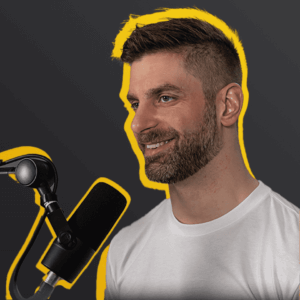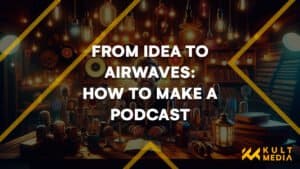Have you ever felt enchanted by a voice that seems to be speaking to your soul directly because of how melodically it resonates? The kind of voice found in how to make a podcast, as it wraps itself around each word, breathing life into every syllable,. It’s an intimate conversation between speaker and listener, but what if this time you were the one speaking?
I remember my first encounter with podcasting—I was instantly bewitched. Suddenly, there was a world where stories danced freely across invisible waves, reaching out far beyond their origins.
In our exploration today, we’ll dive into the rich waters of podcast creation. From sifting through grains of inspiration for unique topics to capturing your own enchanting voice on recording software,. We’ll chart unexplored territories like selecting riveting formats and choosing eye-catching cover art that captures attention at first glance.
The promise we’re making here is straightforward and clear-cut.
If you’re looking to build a brand and grow your business with content creation right now, then why not book a FREE discovery call today? https://www.kult.media/discoverycall/ I guarantee actionable advice on every call.
Understanding the Basics of Podcasting
- Understanding the Basics of Podcasting
- Planning Your Podcast
- Defining Your Audience
- Creating Your Podcast Brand
- Producing Your Podcast
- Distributing and Promoting Your Podcast
- Monetising Your Podcast
- Growing and Nurturing Your Podcast Audience
- FAQs in Relation to How to Make a Podcast
- Conclusion
Understanding the Basics of Podcasting
Diving into the world of podcasting offers an easy way to voice your ideas, share knowledge, or narrate stories to a broad audience. But what makes podcasting easy to grasp for beginners? Essentially, it’s a digital audio series accessible for streaming or download, making it a convenient option for people to listen to topics of interest. Hosting companies and popular podcast directories have simplified the process, allowing creators to reach listeners globally with just a few clicks.
Podcasting has been growing rapidly in popularity over recent years. According to statistics, more and more folks are hopping onto this bandwagon and creating their own unique audio and video narratives on Spotify for Podcasters.
Starting a podcast is straightforward and allows for great freedom of expression. You could have your first episode ready within less than an hour. All you need is some basic equipment, like a good microphone and recording software.
In essence, podcasts are all about connection; they offer listeners intimate access to someone else’s worldview, which builds trust between creator and listener.
The Rise of Podcasting
The rise of podcasting can be attributed to its unprecedented accessibility and the emergence of user-friendly platforms like Spotify for Podcasters. This ease of access has made podcasting an appealing option for creators, allowing them to share their unique voices and stories with an eager global audience. With podcast hosting companies simplifying distribution and popular podcast directories enhancing discoverability, it’s no wonder that more individuals are motivated to start their podcast journey.
But why would anyone want to dive into podcast creation? Well, aside from being able to express oneself freely without restrictions imposed by traditional media channels, there’s something uniquely satisfying about having others engage with your ideas at their own pace, whether during morning commutes or late-night contemplations.
Making Your First Episode: What To Expect?
Embarking on your podcast start, expect to spend time meticulously planning your debut. This preparation involves sifting through numerous podcast topics, possibly scheduling interview guests for a dynamic style interview, and deciding whether a solo narrative or a family podcast vibe suits you best. Recording episodes for your future podcast isn’t just about action; it’s about capturing a moment that resonates. With multiple episodes in mind, ensure each session is a stepping stone towards making podcasting easy for you.
Ensure that your material is not only captivating but also offers listeners something of value. After all, people come back for more when they feel like they’ve learned something or have been entertained in a meaningful way.
Just keep in mind that it’s not only about creating engaging content. What truly matters is providing value to your listeners; that’s the key. Delivering high-quality, meaningful conversations or discussions will definitely help you build a solid and dedicated audience base for your podcast.
Planning Your Podcast
Getting your podcast off the ground involves a couple of key steps. Discovering your individual tone and recognising what you’re enthusiastic about and how it connects to probable audience members’ fascinations is essential.
Selecting Your Topic
The first step is choosing a podcast topic. It’s essential to choose something you love talking about—it could be anything from travel adventures to deep tech insights. Remember, authenticity builds trust and engagement with listeners.
Picking an engaging subject matter isn’t just about personal passion; it also has to resonate with others. Check out this advice from experienced creators, which can help shape your thinking around possible topics.
Choosing Your Format
The next part of planning revolves around selecting a format for your show—think interviews or solo narratives, among other options.
Your chosen style should feel comfortable yet challenge you creatively. Each episode length varies depending on the format; some podcasts might run as short as 15 minutes, while others stretch over several hours.
If in doubt, take time exploring different styles by listening to popular shows within similar genres; like they say, imitation is often the best form of flattery.
Defining Your Audience
Identifying your ideal audience is more than just a smart move; it’s crucial for building a loyal base of listeners. When you know who you’re talking to, it shapes the way you create content and even how that content resonates with those tuning in.
Audience definition isn’t about putting people into boxes or limiting your reach. It’s about understanding listener demographics well enough to craft an experience they’ll appreciate and engage with regularly.
What type of people would be interested in my podcast topic? What do they like? Why would they be interested in my podcast topic?
The Importance of Knowing Your Listener Demographics
Familiarity with your target audience leads to deeper connections. By personalising your message to their preferences and requirements, not only will they be made aware of this, but this connection can also bring about long-term faithfulness in the brand.
Your defined audience guides everything from episode topics to marketing strategies, giving clarity on where the best efforts should be placed for growth potential. This guide offers valuable insights on discovering who makes up your podcast’s target audience effectively.
Making Content That Resonates With Your Listeners
If there’s one thing we’ve learned at Kult Media, it’s that good podcasts aren’t made in isolation; each episode somehow reflects back onto its listeners’ lives. This reflection happens when creators deeply understand their audiences’ experiences, concerns, and desires and weave them subtly throughout every piece of content produced.
In other words, if you want listeners eagerly awaiting every new release, get under the skin of what matters most to them.
Creating Your Podcast Brand
Crafting your podcast brand is pivotal as you embark on your podcast start. A good start involves paying attention to every detail that shapes your podcast’s identity—from picking the perfect podcast name to designing captivating cover art and selecting music that sets the tone. Popular podcast directories and hosting companies look for shows that stand out, so take your time podcasting to ensure your branding resonates. Whether you’re aiming for the style of an interview-based show or a family podcast, each element should contribute to a cohesive and memorable brand that makes people listen.
Picking The Perfect Podcast Name
Choosing an impactful podcast name can be daunting, but remember, it sets the tone of your show. It should resonate with potential listeners while also capturing your podcast’s essence.
Crafting Captivating Cover Art
A picture speaks louder than words. That’s why visually appealing podcast cover art can draw in new audiences at first glance. But don’t fret about perfect graphics skills; simple yet striking designs often do wonders.
The Tune Tells A Tale
Last but not least, consider your intro/outro music; these bookends frame each episode and contribute significantly to overall audio branding elements. Remember, less is often more when it comes to jingles.
This isn’t merely a checklist task; take time exploring options until you find those that feel authentically ‘you’. This creative process forms part of building trust with listeners because consistency in these areas helps shape their expectations about what they’ll get from tuning into each episode.
And now you’re ready… Ready to give life to your ideas by shaping them into an identifiable entity known as ‘Your Podcast’.
Producing Your Podcast
In this article, we’ll take you through the stages of devising an episode, from prior organisation to taping and post-production editing.
Pre-Production Planning
In this first phase, you’re setting the foundation for your show. It’s all about research and organisation. You need to outline what each podcast episode will entail, write interview questions if guests are involved, or script segments for solo shows.
This step helps ensure smooth sailing when you hit record later on. As they say, failing to plan is planning to fail.
Recording Your Podcast Episode
Now comes the fun part—bringing your ideas to life. Use quality podcast equipment, such as a good microphone that can capture clear audio quality; nobody wants static interference interrupting their listening experience. I love the Shure MV7 if you want a microphone that does it all!
If possible, try free podcast recording software before investing heavily in paid versions. The key here isn’t spending loads of money but understanding how these tools work so you feel comfortable during recording sessions.
Post-Production Editing
The final stage requires some technical skills, but fear not; with time and practice, anyone can master it. Post-production includes tasks like cleaning up unwanted sounds from the audio file (like ums and errs) and adding intro/outro music or sound effects where needed using editing software.
Writing great interview questions and crafting engaging scripts can make post-editing smoother because fewer “fixes” will be required afterwards.
In essence, producing high-quality podcasts doesn’t require a Hollywood-style setup, just thoughtful planning and a dash of creativity. Remember to have fun along the way; after all, it’s your podcast.
I recommend spend the time to learn Descript or Reaper to get good at audio post-production.
Distributing and Promoting Your Podcast
Once you’ve crafted your perfect podcast episode, it’s time to get it heard. But how? By distributing and promoting it.
Publishing on Podcast Directories
To start with, let’s discuss distribution. This involves publishing your show to directories such as Spotify for Podcasters. These platforms act like search engines, letting listeners find your content easily. Additionally, don’t forget about Apple Podcasts; being listed here can significantly boost visibility.
Before submitting a podcast for consideration by these directories though, make sure the RSS feed is correctly set up with all relevant information including episode title and description. Key tip: The more accurate the data in this feed, the easier people will find what they’re looking for.
Social Media Promotion: A Must-Have Strategy
Moving onto promotion now – an equally crucial aspect of making a successful podcast. To increase audience reach beyond those who stumble upon your work in directories or through search engines alone (yes Google indexes podcasts too.), consider leveraging social media platforms.
A super simple way to do this is by using tools such as Spotify’s Promo Cards, which help create visually appealing shareable content specifically designed for social networks. So why not give them a whirl?
The Power of Word-of-Mouth Marketing
Last but certainly not least – word-of-mouth marketing. Yes folks that age-old tactic still holds weight today. Get friends talking about episodes over coffee or even enlist guest names featured on shows themselves spreading news amongst their circles – every little helps.
And remember, your listeners are your best advocates. Encourage them to share their favourite episodes with friends or on social media. This will not only help you build trust but also extend the reach of your podcast.
After creating your podcast episode, get it out there. Publish on directories like Spotify and Apple Podcasts for easy discovery. Remember to correctly set up your RSS feed for smooth submission. Promote via social media with tools like Spotify’s Promo Cards and never underestimate the power of word-of-mouth marketing. Encourage listeners to share their favourite episodes.
Monetising Your Podcast
It’s super simple to turn your podcast into a money-making machine. Multiple ways exist, like advertising and listener donations. But let’s dig deeper.
The Power of Advertising
Your favourite podcasts are probably sponsored by brands, right? That’s because advertising is a popular way to make money through podcasting. Ads can appear at the beginning, in the middle or after your podcast has finished playing.
You don’t need millions of listeners, either. Even niche podcasts can attract advertisers if they have an engaged audience.
Fan Funding: The Listener Donations Model
A loyal fan base might just want to support you directly; that’s where listener donations come in handy. Platforms such as Patreon allow fans to make regular payments for exclusive content or perks.
This approach not only monetises your show but also builds trust with listeners who feel more invested in your success.
Diversifying Income Streams: Tipping and Merchandising
Beyond traditional methods, think outside-the-box too. Have you ever considered tipping? It works great on platforms like Twitch, and it can work for podcasts too.
Or how about merchandising? Sell t-shirts, mugs or anything else related to your podcast theme—another fun way to earn some extra cash while increasing brand visibility.
To learn more about these strategies from successful creators themselves join this Spotify for Podcasters Facebook Community. With their help making a good number off those multiple episodes will seem less daunting.
Remember folks – start recording first then hit record on monetisation once you’re comfortable.
Growing and Nurturing Your Podcast Audience
Building an audience for your podcast doesn’t happen overnight. It’s about creating engaging content, promoting it effectively, and staying consistent.
A key aspect is understanding who you’re speaking to. As numerous studies suggest, having a clear image of your target listener helps shape the tone, content, and style of your episodes. Think about their interests—what questions might they have? What difficulties are they endeavouring to surmount?
Finding Your Unique Voice
Your ‘podcast voice’ isn’t just how you sound; it’s also about the words you choose and the ideas you share. Be genuine with your listeners; authenticity can build trust more than anything else.
You may be tempted to imitate popular podcasts, but remember that originality often draws in more listeners over time.
Leveraging Social Media For Growth
Social media platforms offer great opportunities for growth if used wisely. Share snippets from upcoming episodes or behind-the-scenes photos on platforms like Instagram or Twitter; these teasers can create excitement among existing followers while attracting new ones.
The Power Of Consistency And Quality
To keep growing steadily, make sure every episode offers value so people will want to come back for more. Ensure audio quality is top-notch using reliable recording software.
Making Use Of Analytics To Grow Further
Analyzing metrics such as download numbers or average listening times through analytics tools available on most hosting platforms can provide valuable insights into which aspects of your show resonate most with listeners.
Though it may seem like a daunting task, persist in your efforts – your audience awaits. The journey may seem long and tough at times, but keep going – your audience is out there waiting to discover you.
FAQs in Relation to How to Make a Podcast
How do I make a podcast for free?
You can start your own podcast without spending any cash. Use free tools like Audacity for recording and editing, and host on platforms like Anchor.
Can I make my own podcast?
Absolutely. With some passion about a topic, basic tech know-how, and an appetite to share your ideas, you’re ready to create your very own podcast.
How do you make a homemade podcast?
Making a homemade podcast is straightforward. Choose the topic you love talking about most. Record using decent gear in quiet surroundings, then edit it before sharing it with listeners.
Is Spotify for Podcasters free?
Yes, indeed. Spotify allows all creators to upload their podcasts onto its platform at no charge whatsoever.
Conclusion
Podcasting is an adventure, a journey of self-expression. And now you’ve learned how to make a podcast.
The importance of choosing the right topic and format and capturing your unique voice with the correct equipment.
Your audience awaits; understand who they are and tailor your content accordingly. Branding matters—name, cover art, music—all contribute to your podcast’s identity.
You’re ready for production; planning beforehand will ease recording and editing later on.
Distributing? No problem! You know how important directories like Spotify or Apple Podcasts are in reaching listeners.
Promotion tactics are under control too; social media strategies can be super helpful here.
Finally, yet importantly, monetising doesn’t seem so intimidating anymore either!
Thanks for reading all the way through; I really appreciate it and hope this blog helped you. If I can’t answer any questions or help in any way, please reach out. https://www.kult.media/discoverycall/












